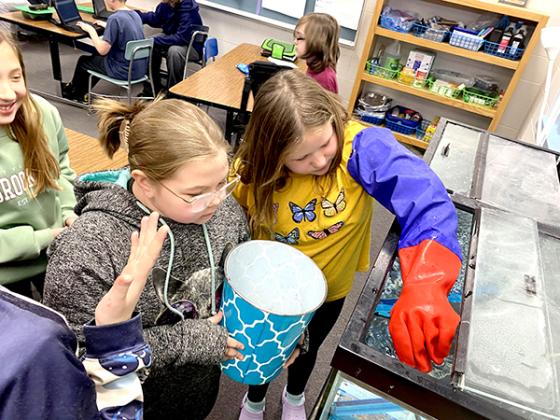IRON COUNTY – Last fall science classes at West Iron County and Forest Park middle schools took on a yearlong project of raising salmon fry from eggs. More than halfway through the project, the salmon are growing in size and the students are engaged in a wide range of related science projects.
While volunteers from the Fred Waara Chapter of Trout Unlimited provided the tanks, chillers, other equipment and help setting things up, the students took over the tanks as soon as the eggs arrived from the Michigan DNR fish hatchery.
“West Iron County sixth graders have found themselves as independent caretakers for almost 100 3.5-inch-long Chinook Salmon” science teacher Brianna Walls says. “The students are independently taking weekly water quality sample tests to test the validity of the tank. They are becoming experts on the nitrogen cycle and how it impacts the tank’s water. The sixth graders are in charge of following and implementing the salmon tank water changes, feeding schedule and equipment maintenance, such as changing filters.”
At Forest Park, middle school science students focus on salmon every Monday. Three students take on the rotating duty of testing the water quality in the tank. Since the class has gained so much knowledge about salmon, they invited in students from elementary school classes for a presentation they created on the salmon.
Along with becoming experts on Chinook Salmon and their life cycle, the salmon have created opportunities to study a wide range of related topics from learning about water quality and other freshwater fish to studying invasive species. At West Iron County, students learned about invasive carp species threatening the Great Lakes and brainstormed possible solutions for the problem. At Forest Park, students spent one class dissecting squid because squid are a major food source for salmon in their natural habitat in the Pacific Ocean. The following week, the students had a chance to try some squid that their teacher, Samantha Dalton, prepared and brought in.
Studying the salmon, caring for the salmon and experiencing the excitement of watching them grow concludes in mid-May when the students participate in releasing the fish into Lake Superior at Black River Harbor.
After the release, the volunteers from Fred Waara Chapter of Trout Unlimited will start planning for next fall’s salmon in the classroom program to give another group of students a chance to enjoy a living science project and get engaged with rivers and fish.
Ten other schools in the U.P. are supported by Trout Unlimited’s program and you can see videos and learn more at the Fred Waara Chapter Facebook page.
Salmon and science are thriving in Forest Park and West Iron County classrooms
Image
Body


